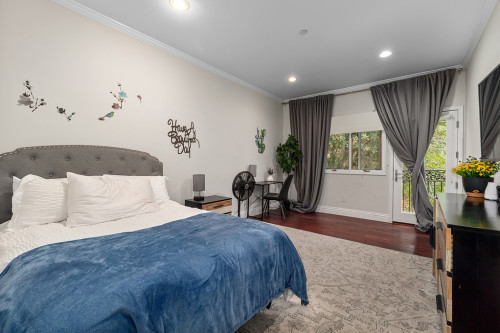






Montare on the Hill
Treatment Focus
This center treats mental health conditions and co-occurring substance use. You receive collaborative, individualized treatment that addresses both issues for whole-person healing.
Primary Level of Care
Offering intensive care with 24/7 monitoring, residential treatment is typically 30 days and can cover multiple levels of care. Length can range from 14 to 90 days typically.
Claimed
Recovery.com has connected directly with this treatment provider to validate the information in their profile.
Treatment Focus
This center treats mental health conditions and co-occurring substance use. You receive collaborative, individualized treatment that addresses both issues for whole-person healing.
Primary Level of Care
Offering intensive care with 24/7 monitoring, residential treatment is typically 30 days and can cover multiple levels of care. Length can range from 14 to 90 days typically.
Provider's Policy
Our residential mental health treatment center in Los Angeles, California, is dedicated to making treatment accessible, and we accept most major insurance plans to accommodate a wide range of individuals.
Montare on the Hill
Montare on the Hill
About Montare on the Hill
Montare Behavioral Health offers comprehensive mental health treatment throughout Southern California. Their Studio City location specializes in assessing, diagnosing, and treating complex psychiatric and emotional issues through a trauma informed, self-empowering lens. They specialize in treating disorders such as depression, anxiety and panic disorders, trauma, post-traumatic stress disorder (PTSD), and complex trauma disorders related to combat/living in a war zone, personality disorders, schizoaffective disorder, bipolar disorder, process addictions, postpartum mental health, failure to launch, gender and sexual identity struggles including LGTBQ+ related conditions, co-occurring drug or alcohol addiction, and more. Their compassionate and experienced staff works on an individual basis with each client, creating a highly personalized treatment plan using a blend of evidence-based and innovative methods combined with group, 1-on-1, family, and couples therapy. Their comprehensive, integrated treatment program offers residential care, intensive outpatient services (IOP), and outpatient programs (OP) for adults, with an additional specialized track for veterans.
Personally Tailored Treatment
Montare on the Hill blends the latest evidence-based treatment modalities with holistic therapeutic options and innovative methods. Clients will have the opportunity to engage in a variety of activities including individual therapy, family therapy, neurofeedback, art and music therapy, acupuncture, mindfulness, meditation, psychiatry and medication management, and yoga. Each treatment plan is personally developed by a team of experienced masters level clinicians and mental health professionals, providing personalized care that is specific to the needs of each client with a strong emphasis on family involvement.
A Tranquil Environment
Their program recognizes the importance that one’s environment plays in achieving freedom from mental health disorders, providing their clients with a luxurious, comfortable living space conducive to healing. Their residential facility in Studio City offers a home-like feel with upscale amenities, including spacious private or shared rooms, en suite baths, shared communal spaces, and quiet, tranquil settings offering privacy. Their large backyard boasts a beautiful in-ground pool with a lounge area and ample comfortable seating. Clients can expect various high-end accommodations with a private on-site chef, gourmet dining, and plenty of space for relaxing. They offer a low staff-to-client ratio with 3 clients for every 1 clinician, treating up to 6 people at a time. Acknowledging that animals can play an important role in emotional stability, clients can bring their small dogs to treatment as long as they are certified as an emotional support animal or service dog.
Center Overview
Treatment Focus
This center treats mental health conditions and co-occurring substance use. You receive collaborative, individualized treatment that addresses both issues for whole-person healing.
Joint Commission Accredited
The Joint Commission accreditation is a voluntary, objective process that evaluates and accredits healthcare organizations (like treatment centers) based on performance standards designed to improve quality and safety for patients. To be accredited means the treatment center has been found to meet the Commission's standards for quality and safety in patient care.
Insurance Accepted
Cash Pay Rates
Estimated Cash Pay Rate
Center pricing can vary based on program and length of stay. Contact the center for more information. Recovery.com strives for price transparency so you can make an informed decision.
Levels of Care






Your Care Options
Specializations
Veterans
Patients who completed active military duty receive specialized treatment focused on trauma, grief, loss, and finding a new work-life balance.
Depression
Symptoms of depression may include fatigue, a sense of numbness, and loss of interest in activities. This condition can range from mild to severe.
Schizophrenia
Schizophrenia is a serious mental health condition that causes hallucinations, delusions, and disordered thinking.
Co-Occurring Disorders
A person with multiple mental health diagnoses, such as addiction and depression, has co-occurring disorders also called dual diagnosis.
Who We Treat
Veterans
Patients who completed active military duty receive specialized treatment focused on trauma, grief, loss, and finding a new work-life balance.
Men and Women
Men and women attend treatment for addiction in a co-ed setting, going to therapy groups together to share experiences, struggles, and successes.
LGBTQ+
Addiction and mental illnesses in the LGBTQ+ community must be treated with an affirming, safe, and relevant approach, which many centers provide.
Approaches
Personalized Treatment
The specific needs, histories, and conditions of individual patients receive personalized, highly relevant care throughout their recovery journey.
Experiential
Expressive tools and therapies help patients process past situations, learn more about themselves, and find healing through action.
Holistic
A non-medicinal, wellness-focused approach that aims to align the mind, body, and spirit for deep and lasting healing.
Evidence-Based
A combination of scientifically rooted therapies and treatments make up evidence-based care, defined by their measured and proven results.
Therapies
1-on-1 Counseling
Patient and therapist meet 1-on-1 to work through difficult emotions and behavioral challenges in a personal, private setting.
Family Therapy
Family therapy addresses group dynamics within a family system, with a focus on improving communication and interrupting unhealthy relationship patterns.
Acceptance and Commitment Therapy (ACT)
This cognitive behavioral therapy teaches patients to accept challenging feelings and make the appropriate changes to reach personal goals.
Art Therapy
Visual art invites patients to examine the emotions within their work, focusing on the process of creativity and its gentle therapeutic power.
Somatic Experiencing
This method treats emotional trauma stored in the body. A therapist helps patients work through the physical feelings associated with emotional pain.
Trauma-Specific Therapy
This form of talk therapy addresses any childhood trauma at the root of a patient's current diagnosis.
Conditions We Treat
Post Traumatic Stress Disorder
PTSD is a long-term mental health issue caused by a disturbing event or events. Symptoms include anxiety, dissociation, flashbacks, and intrusive thoughts.
Anxiety
Anxiety is a common mental health condition that can include excessive worry, panic attacks, physical tension, and increased blood pressure.
Depression
Symptoms of depression may include fatigue, a sense of numbness, and loss of interest in activities. This condition can range from mild to severe.
Schizophrenia
Schizophrenia is a serious mental health condition that causes hallucinations, delusions, and disordered thinking.
Grief and Loss
Grief is a natural reaction to loss, but severe grief can interfere with your ability to function. You can get treatment for this condition.
Suicidality
With suicidality, a person fantasizes about suicide, or makes a plan to carry it out. This is a serious mental health symptom.
Obsessive Compulsive Disorder (OCD)
OCD is characterized by intrusive and distressing thoughts that drive repetitive behaviors. This pattern disrupts daily life and relationships.
Personality Disorders
Personality disorders destabilize the way a person thinks, feels, and behaves. If untreated, they can undermine relationships and lead to severe distress.
Substances We Treat
Co-Occurring Disorders
A person with multiple mental health diagnoses, such as addiction and depression, has co-occurring disorders also called dual diagnosis.
Drug Addiction
Drug addiction is the excessive and repetitive use of substances, despite harmful consequences to a person's life, health, and relationships.
Languages
Aftercare
Care Designed for Your Needs
Personal Amenities
Amenities
Special Considerations
Healthy Meals are provided
Great food meets great treatment, with providers serving healthy meals to restore nutrition, wellbeing, and health.
Activities
Yoga
Yoga is both a physical and spiritual practice. It includes a flow of movement, breathing techniques, and meditation.





